Early Childhood Education: Personal Professional Philosophy
VerifiedAdded on 2023/01/19
|12
|2350
|80
Essay
AI Summary
This essay presents a kindergarten teacher's personal and professional philosophy on various aspects of early childhood education. It begins by emphasizing the importance of documentation, detailing a step-by-step process for collecting and displaying student work, utilizing technology, and integrating student feedback. The essay then explores the importance of planning, outlining a three-stage process of planning, implementation, and evaluation, with examples. Assessment methods, including observation, portfolios, and standardized tests, are discussed, aligning with national quality standards. Finally, the essay describes the teacher's approach to teaching young children, emphasizing the creation of an engaging learning environment, practical applications, and conflict resolution. The essay concludes by reiterating the importance of communication between parents and educators.
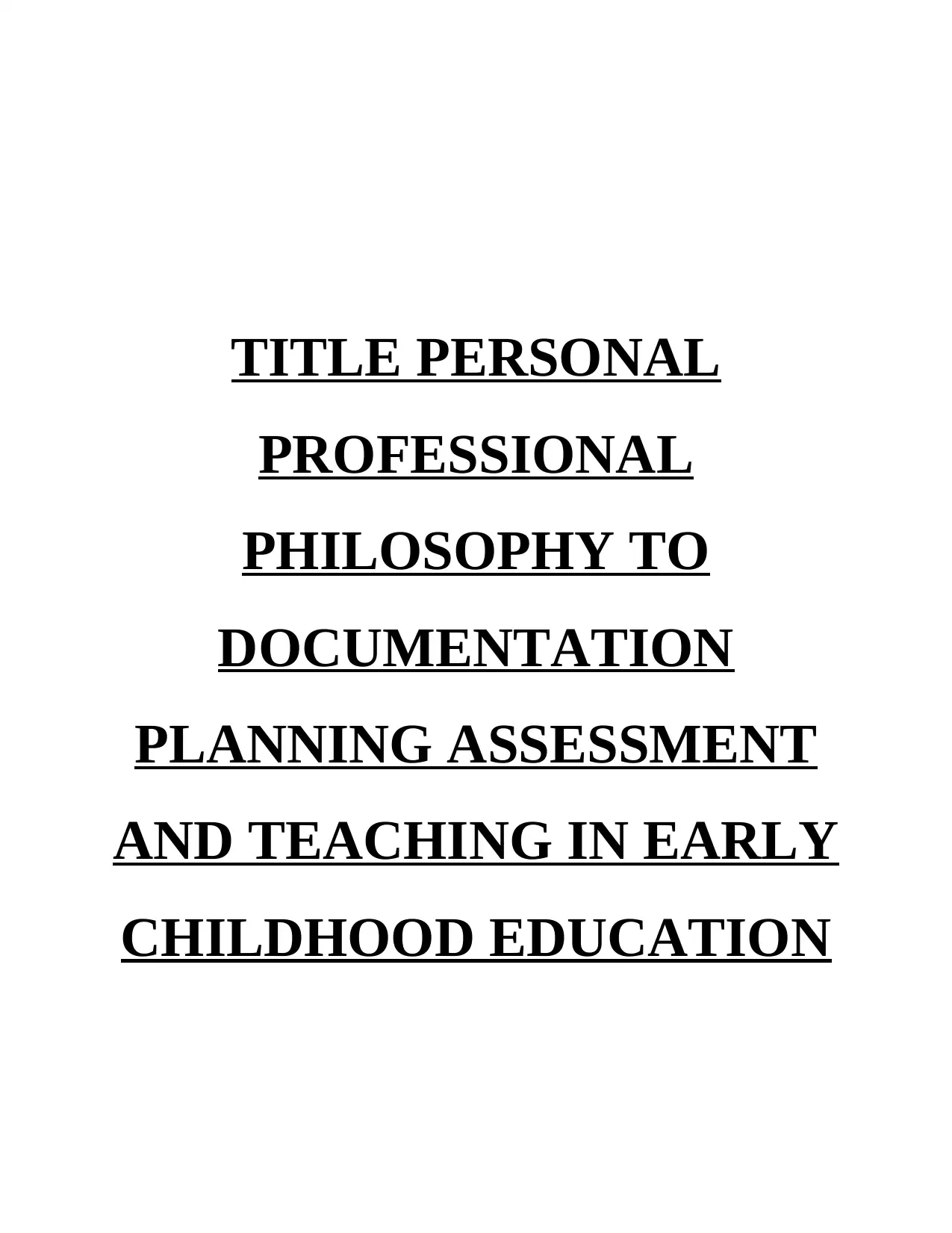
TITLE PERSONAL
PROFESSIONAL
PHILOSOPHY TO
DOCUMENTATION
PLANNING ASSESSMENT
AND TEACHING IN EARLY
CHILDHOOD EDUCATION
PROFESSIONAL
PHILOSOPHY TO
DOCUMENTATION
PLANNING ASSESSMENT
AND TEACHING IN EARLY
CHILDHOOD EDUCATION
Paraphrase This Document
Need a fresh take? Get an instant paraphrase of this document with our AI Paraphraser
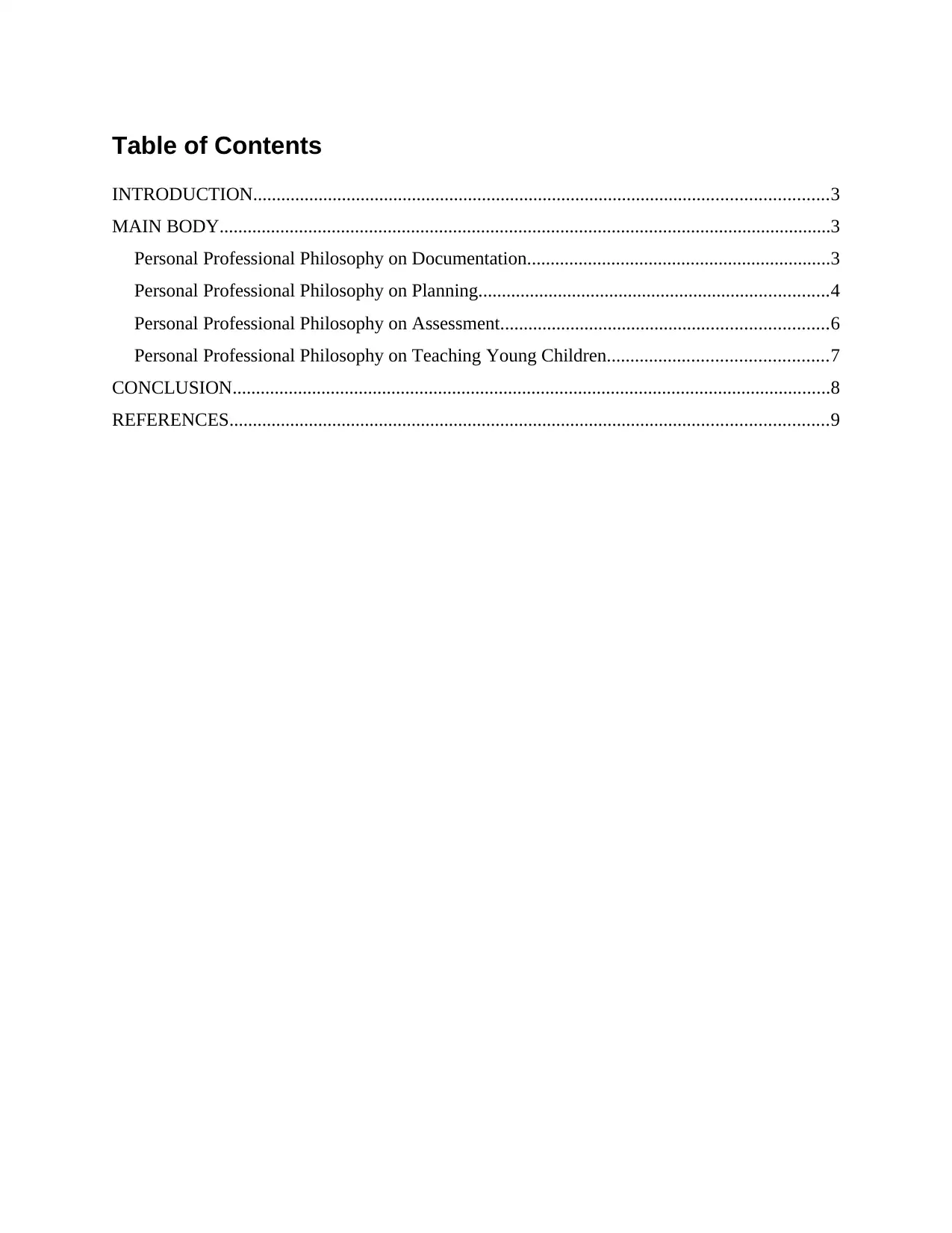
Table of Contents
INTRODUCTION...........................................................................................................................3
MAIN BODY...................................................................................................................................3
Personal Professional Philosophy on Documentation.................................................................3
Personal Professional Philosophy on Planning...........................................................................4
Personal Professional Philosophy on Assessment......................................................................6
Personal Professional Philosophy on Teaching Young Children...............................................7
CONCLUSION................................................................................................................................8
REFERENCES................................................................................................................................9
INTRODUCTION...........................................................................................................................3
MAIN BODY...................................................................................................................................3
Personal Professional Philosophy on Documentation.................................................................3
Personal Professional Philosophy on Planning...........................................................................4
Personal Professional Philosophy on Assessment......................................................................6
Personal Professional Philosophy on Teaching Young Children...............................................7
CONCLUSION................................................................................................................................8
REFERENCES................................................................................................................................9
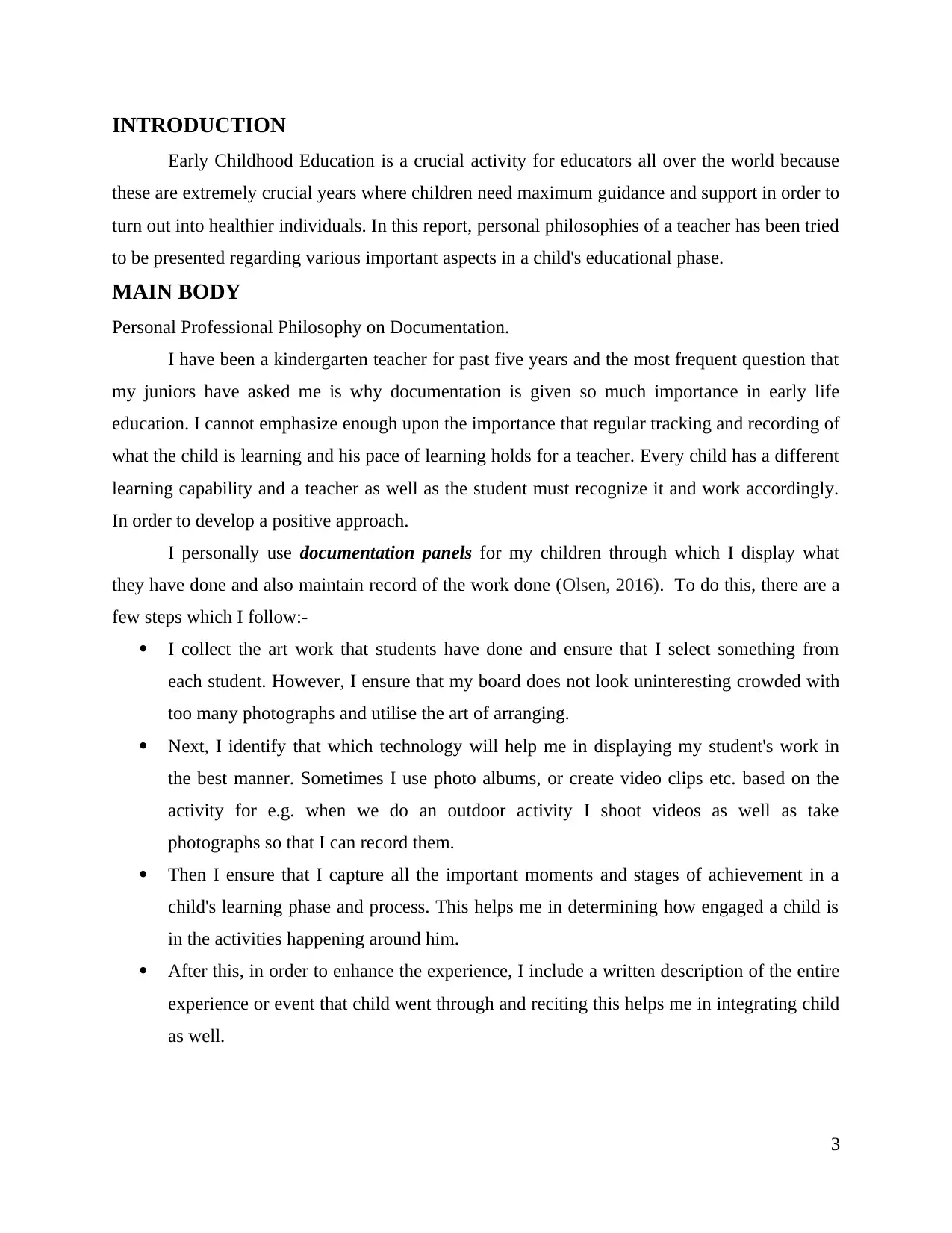
INTRODUCTION
Early Childhood Education is a crucial activity for educators all over the world because
these are extremely crucial years where children need maximum guidance and support in order to
turn out into healthier individuals. In this report, personal philosophies of a teacher has been tried
to be presented regarding various important aspects in a child's educational phase.
MAIN BODY
Personal Professional Philosophy on Documentation.
I have been a kindergarten teacher for past five years and the most frequent question that
my juniors have asked me is why documentation is given so much importance in early life
education. I cannot emphasize enough upon the importance that regular tracking and recording of
what the child is learning and his pace of learning holds for a teacher. Every child has a different
learning capability and a teacher as well as the student must recognize it and work accordingly.
In order to develop a positive approach.
I personally use documentation panels for my children through which I display what
they have done and also maintain record of the work done (Olsen, 2016). To do this, there are a
few steps which I follow:-
I collect the art work that students have done and ensure that I select something from
each student. However, I ensure that my board does not look uninteresting crowded with
too many photographs and utilise the art of arranging.
Next, I identify that which technology will help me in displaying my student's work in
the best manner. Sometimes I use photo albums, or create video clips etc. based on the
activity for e.g. when we do an outdoor activity I shoot videos as well as take
photographs so that I can record them.
Then I ensure that I capture all the important moments and stages of achievement in a
child's learning phase and process. This helps me in determining how engaged a child is
in the activities happening around him.
After this, in order to enhance the experience, I include a written description of the entire
experience or event that child went through and reciting this helps me in integrating child
as well.
3
Early Childhood Education is a crucial activity for educators all over the world because
these are extremely crucial years where children need maximum guidance and support in order to
turn out into healthier individuals. In this report, personal philosophies of a teacher has been tried
to be presented regarding various important aspects in a child's educational phase.
MAIN BODY
Personal Professional Philosophy on Documentation.
I have been a kindergarten teacher for past five years and the most frequent question that
my juniors have asked me is why documentation is given so much importance in early life
education. I cannot emphasize enough upon the importance that regular tracking and recording of
what the child is learning and his pace of learning holds for a teacher. Every child has a different
learning capability and a teacher as well as the student must recognize it and work accordingly.
In order to develop a positive approach.
I personally use documentation panels for my children through which I display what
they have done and also maintain record of the work done (Olsen, 2016). To do this, there are a
few steps which I follow:-
I collect the art work that students have done and ensure that I select something from
each student. However, I ensure that my board does not look uninteresting crowded with
too many photographs and utilise the art of arranging.
Next, I identify that which technology will help me in displaying my student's work in
the best manner. Sometimes I use photo albums, or create video clips etc. based on the
activity for e.g. when we do an outdoor activity I shoot videos as well as take
photographs so that I can record them.
Then I ensure that I capture all the important moments and stages of achievement in a
child's learning phase and process. This helps me in determining how engaged a child is
in the activities happening around him.
After this, in order to enhance the experience, I include a written description of the entire
experience or event that child went through and reciting this helps me in integrating child
as well.
3
⊘ This is a preview!⊘
Do you want full access?
Subscribe today to unlock all pages.

Trusted by 1+ million students worldwide

Lastly, I also frame very easy questions through which I ask children how they felt or
what was the most important thing for them etc. so that I could know what they actually
felt during the process.
Thus, documentation of the children's work helps in presenting a summarised view of their
learning and also ensures that it is at par with the curriculum that has been devised for the
children. Documentation helps in preparation of a base through which a child can be further
assessed and helps the evaluator in developing an insight into child's thinking process and
mentality so that his further education can take place accordingly.
Personal Professional Philosophy on Planning.
When the documentation part is successfully done on behalf of the educator, the next
aspect on which I emphasize is proper planning in order to ensure that the child's growth and
4
Illu
stration 1: Display of a student Pete's work
Source: Meaningful Documentation in the Early Childhood Classroom, 2016
what was the most important thing for them etc. so that I could know what they actually
felt during the process.
Thus, documentation of the children's work helps in presenting a summarised view of their
learning and also ensures that it is at par with the curriculum that has been devised for the
children. Documentation helps in preparation of a base through which a child can be further
assessed and helps the evaluator in developing an insight into child's thinking process and
mentality so that his further education can take place accordingly.
Personal Professional Philosophy on Planning.
When the documentation part is successfully done on behalf of the educator, the next
aspect on which I emphasize is proper planning in order to ensure that the child's growth and
4
Illu
stration 1: Display of a student Pete's work
Source: Meaningful Documentation in the Early Childhood Classroom, 2016
Paraphrase This Document
Need a fresh take? Get an instant paraphrase of this document with our AI Paraphraser
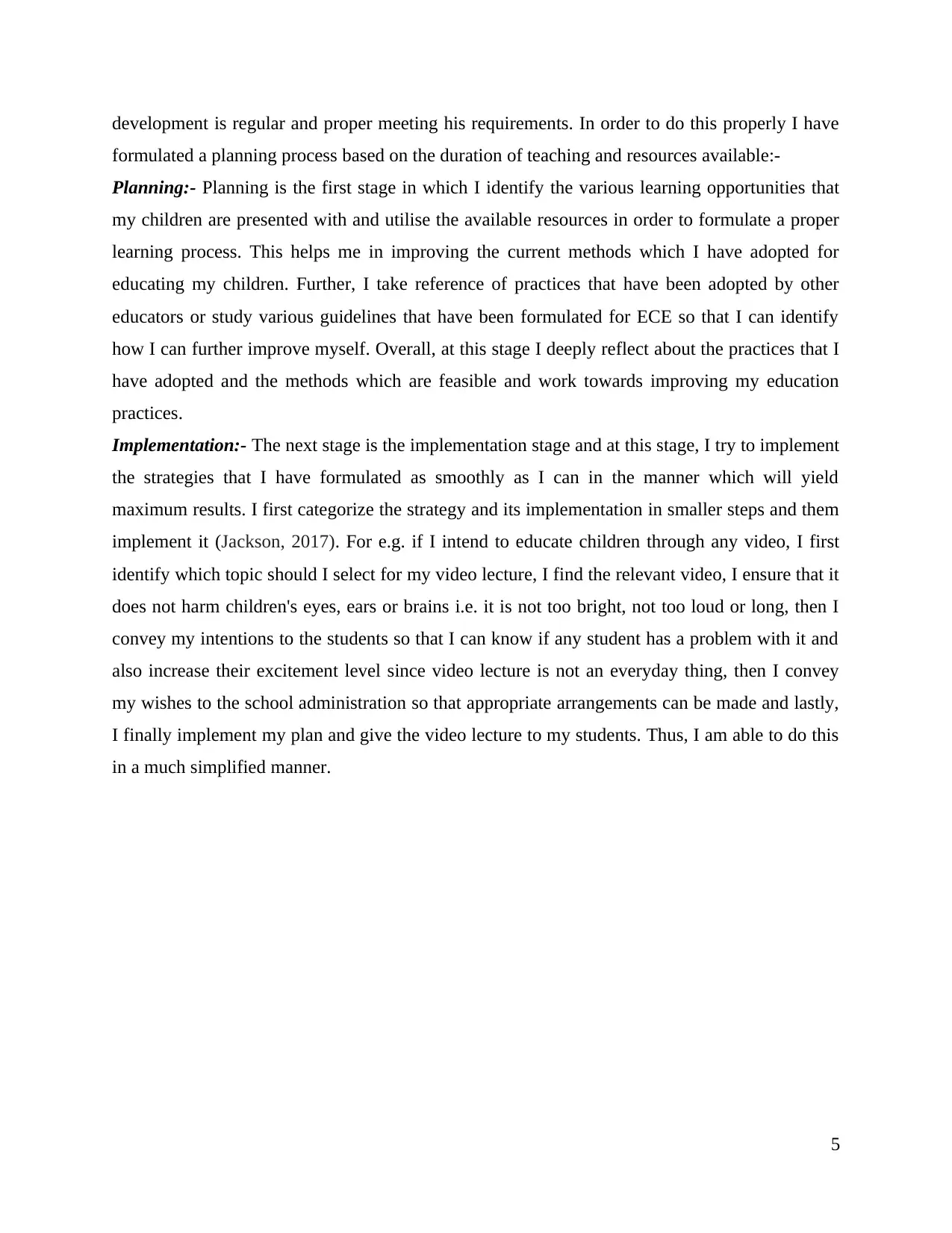
development is regular and proper meeting his requirements. In order to do this properly I have
formulated a planning process based on the duration of teaching and resources available:-
Planning:- Planning is the first stage in which I identify the various learning opportunities that
my children are presented with and utilise the available resources in order to formulate a proper
learning process. This helps me in improving the current methods which I have adopted for
educating my children. Further, I take reference of practices that have been adopted by other
educators or study various guidelines that have been formulated for ECE so that I can identify
how I can further improve myself. Overall, at this stage I deeply reflect about the practices that I
have adopted and the methods which are feasible and work towards improving my education
practices.
Implementation:- The next stage is the implementation stage and at this stage, I try to implement
the strategies that I have formulated as smoothly as I can in the manner which will yield
maximum results. I first categorize the strategy and its implementation in smaller steps and them
implement it (Jackson, 2017). For e.g. if I intend to educate children through any video, I first
identify which topic should I select for my video lecture, I find the relevant video, I ensure that it
does not harm children's eyes, ears or brains i.e. it is not too bright, not too loud or long, then I
convey my intentions to the students so that I can know if any student has a problem with it and
also increase their excitement level since video lecture is not an everyday thing, then I convey
my wishes to the school administration so that appropriate arrangements can be made and lastly,
I finally implement my plan and give the video lecture to my students. Thus, I am able to do this
in a much simplified manner.
5
formulated a planning process based on the duration of teaching and resources available:-
Planning:- Planning is the first stage in which I identify the various learning opportunities that
my children are presented with and utilise the available resources in order to formulate a proper
learning process. This helps me in improving the current methods which I have adopted for
educating my children. Further, I take reference of practices that have been adopted by other
educators or study various guidelines that have been formulated for ECE so that I can identify
how I can further improve myself. Overall, at this stage I deeply reflect about the practices that I
have adopted and the methods which are feasible and work towards improving my education
practices.
Implementation:- The next stage is the implementation stage and at this stage, I try to implement
the strategies that I have formulated as smoothly as I can in the manner which will yield
maximum results. I first categorize the strategy and its implementation in smaller steps and them
implement it (Jackson, 2017). For e.g. if I intend to educate children through any video, I first
identify which topic should I select for my video lecture, I find the relevant video, I ensure that it
does not harm children's eyes, ears or brains i.e. it is not too bright, not too loud or long, then I
convey my intentions to the students so that I can know if any student has a problem with it and
also increase their excitement level since video lecture is not an everyday thing, then I convey
my wishes to the school administration so that appropriate arrangements can be made and lastly,
I finally implement my plan and give the video lecture to my students. Thus, I am able to do this
in a much simplified manner.
5
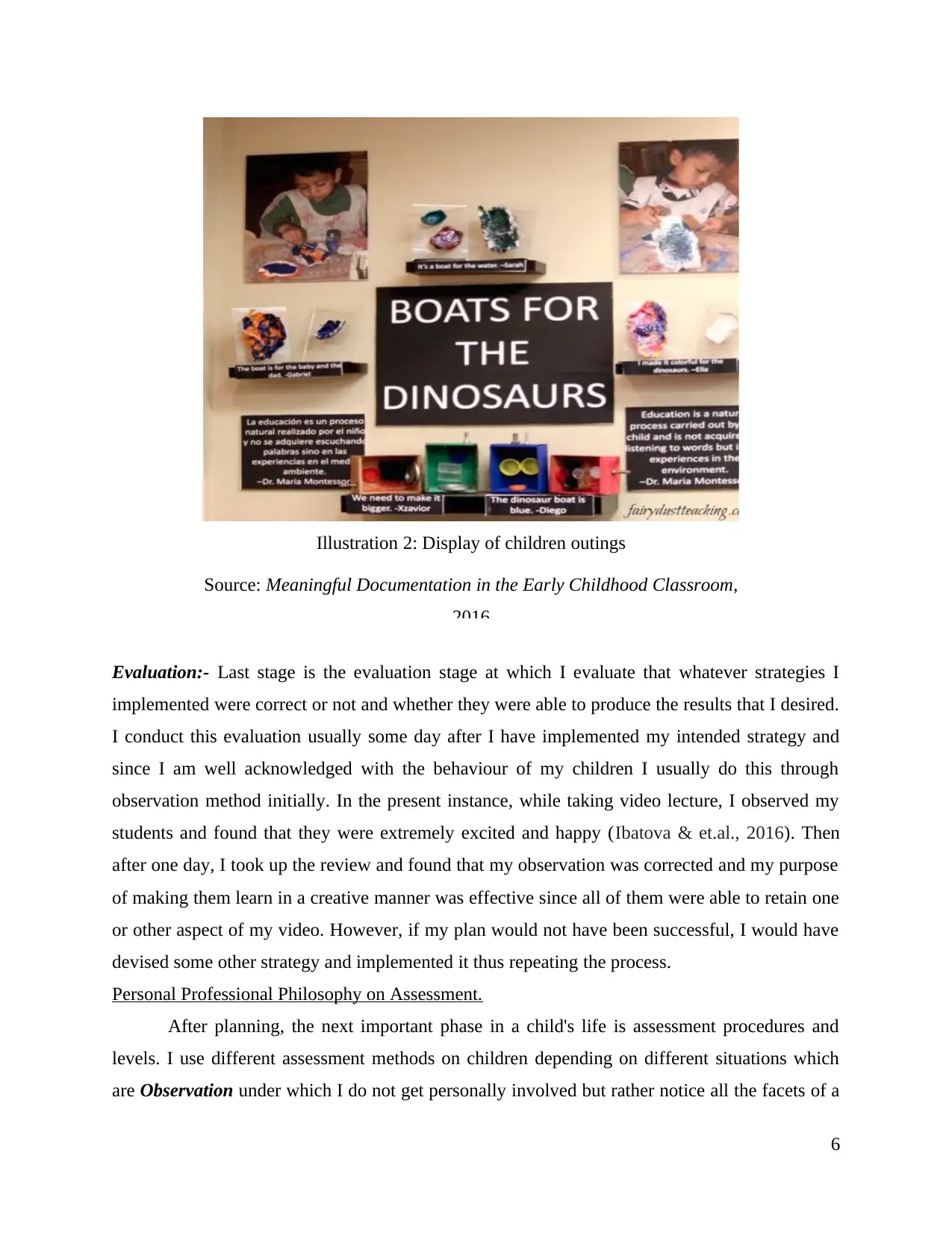
Evaluation:- Last stage is the evaluation stage at which I evaluate that whatever strategies I
implemented were correct or not and whether they were able to produce the results that I desired.
I conduct this evaluation usually some day after I have implemented my intended strategy and
since I am well acknowledged with the behaviour of my children I usually do this through
observation method initially. In the present instance, while taking video lecture, I observed my
students and found that they were extremely excited and happy (Ibatova & et.al., 2016). Then
after one day, I took up the review and found that my observation was corrected and my purpose
of making them learn in a creative manner was effective since all of them were able to retain one
or other aspect of my video. However, if my plan would not have been successful, I would have
devised some other strategy and implemented it thus repeating the process.
Personal Professional Philosophy on Assessment.
After planning, the next important phase in a child's life is assessment procedures and
levels. I use different assessment methods on children depending on different situations which
are Observation under which I do not get personally involved but rather notice all the facets of a
6
Illustration 2: Display of children outings
Source: Meaningful Documentation in the Early Childhood Classroom,
2016
implemented were correct or not and whether they were able to produce the results that I desired.
I conduct this evaluation usually some day after I have implemented my intended strategy and
since I am well acknowledged with the behaviour of my children I usually do this through
observation method initially. In the present instance, while taking video lecture, I observed my
students and found that they were extremely excited and happy (Ibatova & et.al., 2016). Then
after one day, I took up the review and found that my observation was corrected and my purpose
of making them learn in a creative manner was effective since all of them were able to retain one
or other aspect of my video. However, if my plan would not have been successful, I would have
devised some other strategy and implemented it thus repeating the process.
Personal Professional Philosophy on Assessment.
After planning, the next important phase in a child's life is assessment procedures and
levels. I use different assessment methods on children depending on different situations which
are Observation under which I do not get personally involved but rather notice all the facets of a
6
Illustration 2: Display of children outings
Source: Meaningful Documentation in the Early Childhood Classroom,
2016
⊘ This is a preview!⊘
Do you want full access?
Subscribe today to unlock all pages.

Trusted by 1+ million students worldwide
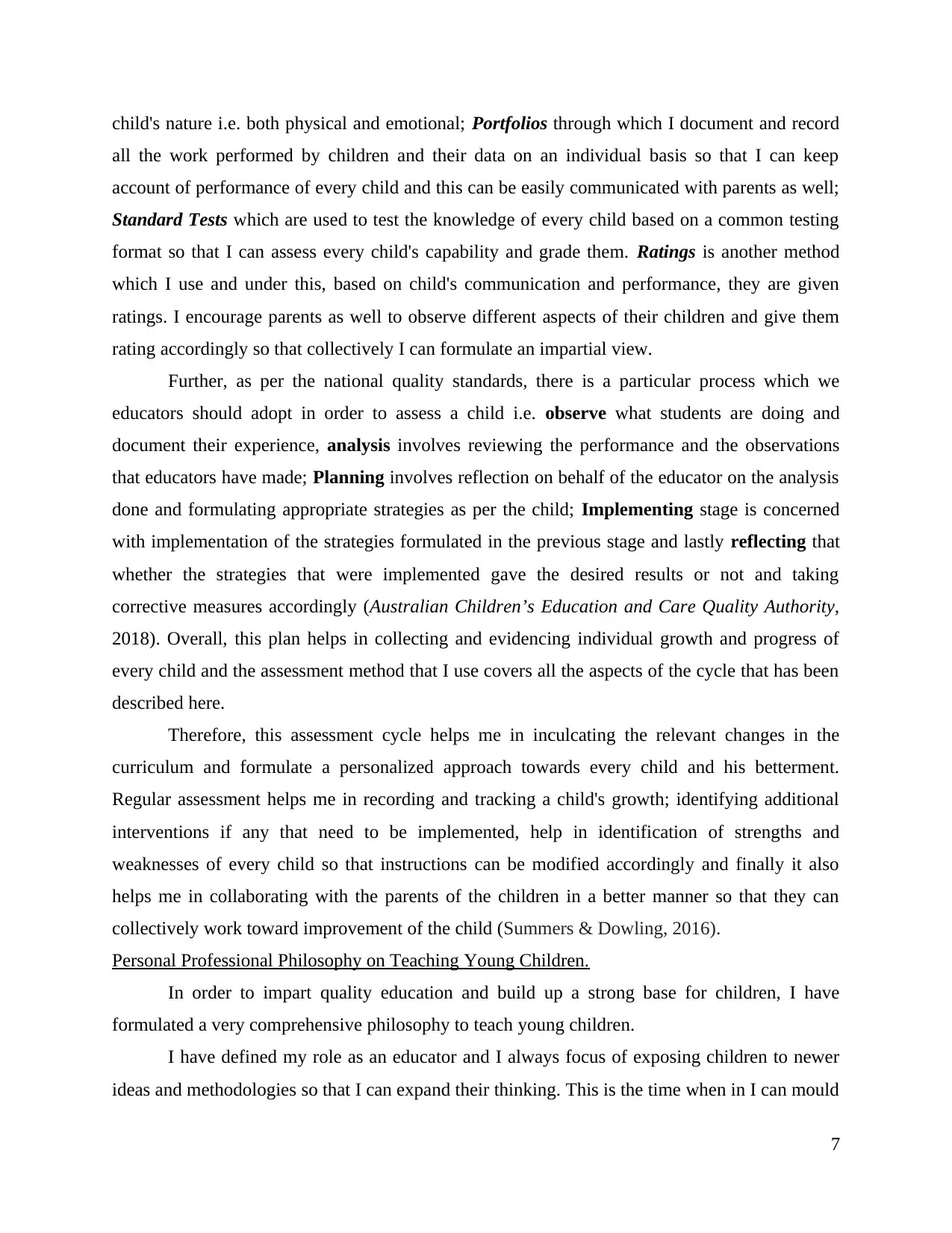
child's nature i.e. both physical and emotional; Portfolios through which I document and record
all the work performed by children and their data on an individual basis so that I can keep
account of performance of every child and this can be easily communicated with parents as well;
Standard Tests which are used to test the knowledge of every child based on a common testing
format so that I can assess every child's capability and grade them. Ratings is another method
which I use and under this, based on child's communication and performance, they are given
ratings. I encourage parents as well to observe different aspects of their children and give them
rating accordingly so that collectively I can formulate an impartial view.
Further, as per the national quality standards, there is a particular process which we
educators should adopt in order to assess a child i.e. observe what students are doing and
document their experience, analysis involves reviewing the performance and the observations
that educators have made; Planning involves reflection on behalf of the educator on the analysis
done and formulating appropriate strategies as per the child; Implementing stage is concerned
with implementation of the strategies formulated in the previous stage and lastly reflecting that
whether the strategies that were implemented gave the desired results or not and taking
corrective measures accordingly (Australian Children’s Education and Care Quality Authority,
2018). Overall, this plan helps in collecting and evidencing individual growth and progress of
every child and the assessment method that I use covers all the aspects of the cycle that has been
described here.
Therefore, this assessment cycle helps me in inculcating the relevant changes in the
curriculum and formulate a personalized approach towards every child and his betterment.
Regular assessment helps me in recording and tracking a child's growth; identifying additional
interventions if any that need to be implemented, help in identification of strengths and
weaknesses of every child so that instructions can be modified accordingly and finally it also
helps me in collaborating with the parents of the children in a better manner so that they can
collectively work toward improvement of the child (Summers & Dowling, 2016).
Personal Professional Philosophy on Teaching Young Children.
In order to impart quality education and build up a strong base for children, I have
formulated a very comprehensive philosophy to teach young children.
I have defined my role as an educator and I always focus of exposing children to newer
ideas and methodologies so that I can expand their thinking. This is the time when in I can mould
7
all the work performed by children and their data on an individual basis so that I can keep
account of performance of every child and this can be easily communicated with parents as well;
Standard Tests which are used to test the knowledge of every child based on a common testing
format so that I can assess every child's capability and grade them. Ratings is another method
which I use and under this, based on child's communication and performance, they are given
ratings. I encourage parents as well to observe different aspects of their children and give them
rating accordingly so that collectively I can formulate an impartial view.
Further, as per the national quality standards, there is a particular process which we
educators should adopt in order to assess a child i.e. observe what students are doing and
document their experience, analysis involves reviewing the performance and the observations
that educators have made; Planning involves reflection on behalf of the educator on the analysis
done and formulating appropriate strategies as per the child; Implementing stage is concerned
with implementation of the strategies formulated in the previous stage and lastly reflecting that
whether the strategies that were implemented gave the desired results or not and taking
corrective measures accordingly (Australian Children’s Education and Care Quality Authority,
2018). Overall, this plan helps in collecting and evidencing individual growth and progress of
every child and the assessment method that I use covers all the aspects of the cycle that has been
described here.
Therefore, this assessment cycle helps me in inculcating the relevant changes in the
curriculum and formulate a personalized approach towards every child and his betterment.
Regular assessment helps me in recording and tracking a child's growth; identifying additional
interventions if any that need to be implemented, help in identification of strengths and
weaknesses of every child so that instructions can be modified accordingly and finally it also
helps me in collaborating with the parents of the children in a better manner so that they can
collectively work toward improvement of the child (Summers & Dowling, 2016).
Personal Professional Philosophy on Teaching Young Children.
In order to impart quality education and build up a strong base for children, I have
formulated a very comprehensive philosophy to teach young children.
I have defined my role as an educator and I always focus of exposing children to newer
ideas and methodologies so that I can expand their thinking. This is the time when in I can mould
7
Paraphrase This Document
Need a fresh take? Get an instant paraphrase of this document with our AI Paraphraser
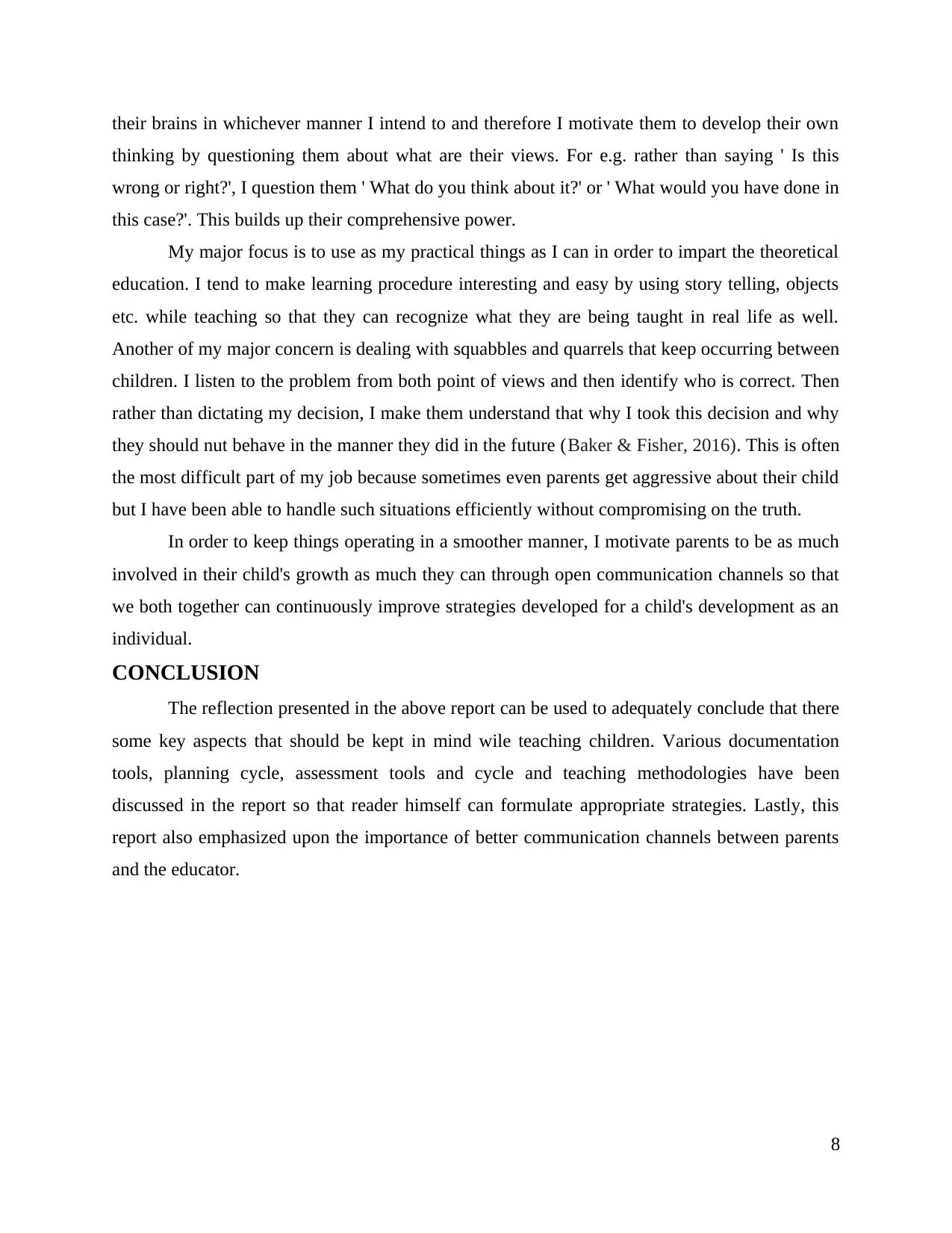
their brains in whichever manner I intend to and therefore I motivate them to develop their own
thinking by questioning them about what are their views. For e.g. rather than saying ' Is this
wrong or right?', I question them ' What do you think about it?' or ' What would you have done in
this case?'. This builds up their comprehensive power.
My major focus is to use as my practical things as I can in order to impart the theoretical
education. I tend to make learning procedure interesting and easy by using story telling, objects
etc. while teaching so that they can recognize what they are being taught in real life as well.
Another of my major concern is dealing with squabbles and quarrels that keep occurring between
children. I listen to the problem from both point of views and then identify who is correct. Then
rather than dictating my decision, I make them understand that why I took this decision and why
they should nut behave in the manner they did in the future (Baker & Fisher, 2016). This is often
the most difficult part of my job because sometimes even parents get aggressive about their child
but I have been able to handle such situations efficiently without compromising on the truth.
In order to keep things operating in a smoother manner, I motivate parents to be as much
involved in their child's growth as much they can through open communication channels so that
we both together can continuously improve strategies developed for a child's development as an
individual.
CONCLUSION
The reflection presented in the above report can be used to adequately conclude that there
some key aspects that should be kept in mind wile teaching children. Various documentation
tools, planning cycle, assessment tools and cycle and teaching methodologies have been
discussed in the report so that reader himself can formulate appropriate strategies. Lastly, this
report also emphasized upon the importance of better communication channels between parents
and the educator.
8
thinking by questioning them about what are their views. For e.g. rather than saying ' Is this
wrong or right?', I question them ' What do you think about it?' or ' What would you have done in
this case?'. This builds up their comprehensive power.
My major focus is to use as my practical things as I can in order to impart the theoretical
education. I tend to make learning procedure interesting and easy by using story telling, objects
etc. while teaching so that they can recognize what they are being taught in real life as well.
Another of my major concern is dealing with squabbles and quarrels that keep occurring between
children. I listen to the problem from both point of views and then identify who is correct. Then
rather than dictating my decision, I make them understand that why I took this decision and why
they should nut behave in the manner they did in the future (Baker & Fisher, 2016). This is often
the most difficult part of my job because sometimes even parents get aggressive about their child
but I have been able to handle such situations efficiently without compromising on the truth.
In order to keep things operating in a smoother manner, I motivate parents to be as much
involved in their child's growth as much they can through open communication channels so that
we both together can continuously improve strategies developed for a child's development as an
individual.
CONCLUSION
The reflection presented in the above report can be used to adequately conclude that there
some key aspects that should be kept in mind wile teaching children. Various documentation
tools, planning cycle, assessment tools and cycle and teaching methodologies have been
discussed in the report so that reader himself can formulate appropriate strategies. Lastly, this
report also emphasized upon the importance of better communication channels between parents
and the educator.
8
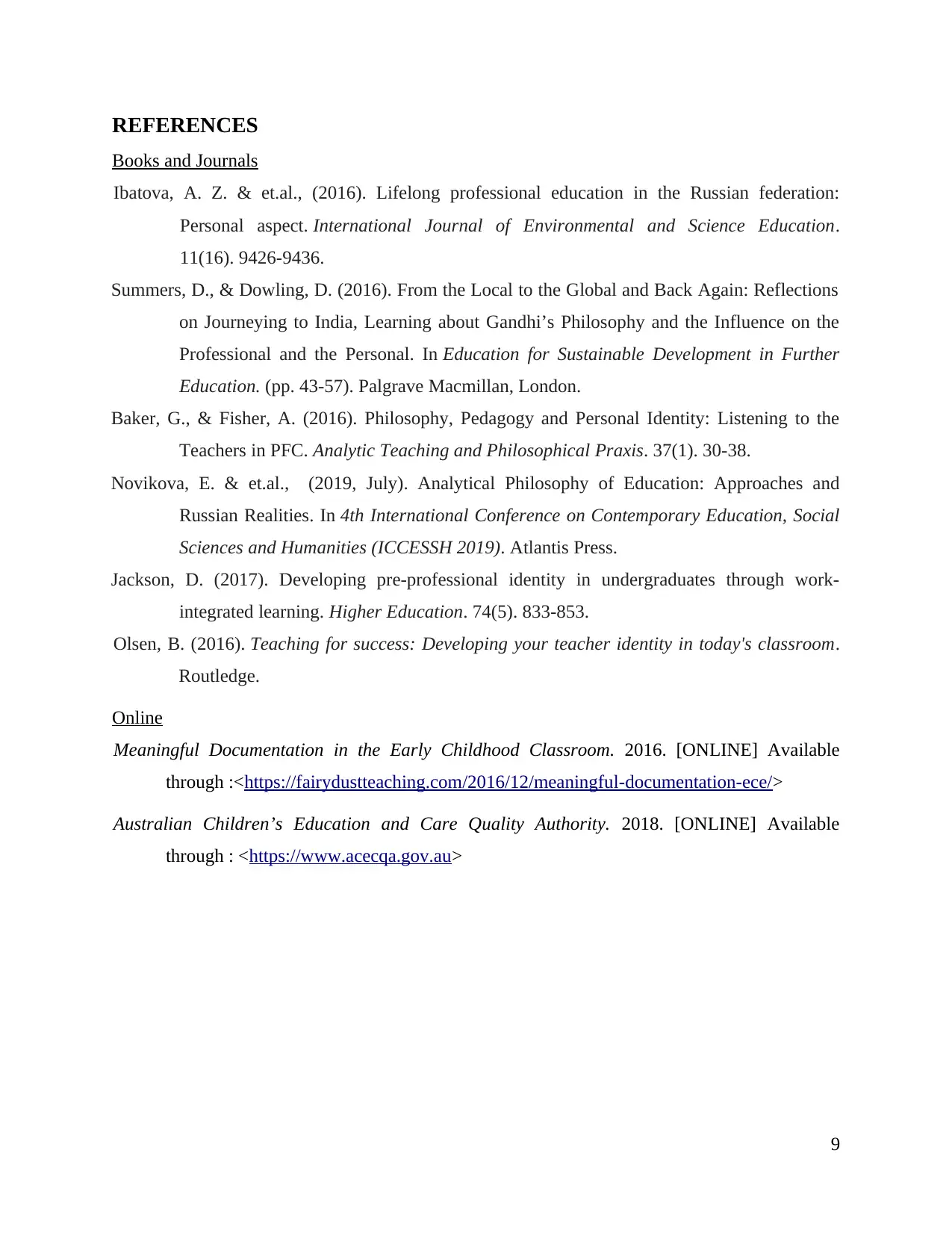
REFERENCES
Books and Journals
Ibatova, A. Z. & et.al., (2016). Lifelong professional education in the Russian federation:
Personal aspect. International Journal of Environmental and Science Education.
11(16). 9426-9436.
Summers, D., & Dowling, D. (2016). From the Local to the Global and Back Again: Reflections
on Journeying to India, Learning about Gandhi’s Philosophy and the Influence on the
Professional and the Personal. In Education for Sustainable Development in Further
Education. (pp. 43-57). Palgrave Macmillan, London.
Baker, G., & Fisher, A. (2016). Philosophy, Pedagogy and Personal Identity: Listening to the
Teachers in PFC. Analytic Teaching and Philosophical Praxis. 37(1). 30-38.
Novikova, E. & et.al., (2019, July). Analytical Philosophy of Education: Approaches and
Russian Realities. In 4th International Conference on Contemporary Education, Social
Sciences and Humanities (ICCESSH 2019). Atlantis Press.
Jackson, D. (2017). Developing pre-professional identity in undergraduates through work-
integrated learning. Higher Education. 74(5). 833-853.
Olsen, B. (2016). Teaching for success: Developing your teacher identity in today's classroom.
Routledge.
Online
Meaningful Documentation in the Early Childhood Classroom. 2016. [ONLINE] Available
through :<https://fairydustteaching.com/2016/12/meaningful-documentation-ece/>
Australian Children’s Education and Care Quality Authority. 2018. [ONLINE] Available
through : <https://www.acecqa.gov.au>
9
Books and Journals
Ibatova, A. Z. & et.al., (2016). Lifelong professional education in the Russian federation:
Personal aspect. International Journal of Environmental and Science Education.
11(16). 9426-9436.
Summers, D., & Dowling, D. (2016). From the Local to the Global and Back Again: Reflections
on Journeying to India, Learning about Gandhi’s Philosophy and the Influence on the
Professional and the Personal. In Education for Sustainable Development in Further
Education. (pp. 43-57). Palgrave Macmillan, London.
Baker, G., & Fisher, A. (2016). Philosophy, Pedagogy and Personal Identity: Listening to the
Teachers in PFC. Analytic Teaching and Philosophical Praxis. 37(1). 30-38.
Novikova, E. & et.al., (2019, July). Analytical Philosophy of Education: Approaches and
Russian Realities. In 4th International Conference on Contemporary Education, Social
Sciences and Humanities (ICCESSH 2019). Atlantis Press.
Jackson, D. (2017). Developing pre-professional identity in undergraduates through work-
integrated learning. Higher Education. 74(5). 833-853.
Olsen, B. (2016). Teaching for success: Developing your teacher identity in today's classroom.
Routledge.
Online
Meaningful Documentation in the Early Childhood Classroom. 2016. [ONLINE] Available
through :<https://fairydustteaching.com/2016/12/meaningful-documentation-ece/>
Australian Children’s Education and Care Quality Authority. 2018. [ONLINE] Available
through : <https://www.acecqa.gov.au>
9
⊘ This is a preview!⊘
Do you want full access?
Subscribe today to unlock all pages.

Trusted by 1+ million students worldwide
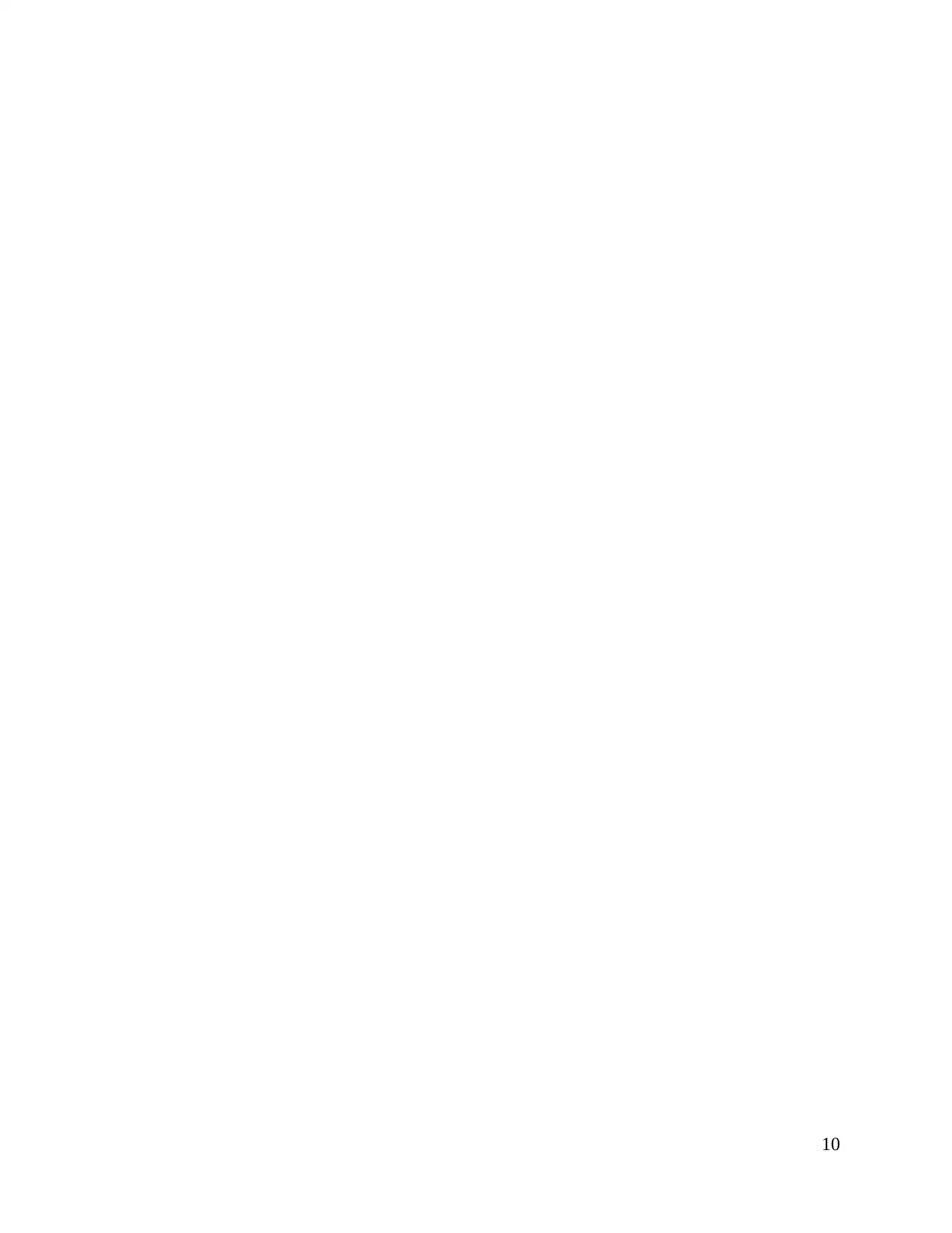
10
Paraphrase This Document
Need a fresh take? Get an instant paraphrase of this document with our AI Paraphraser

11
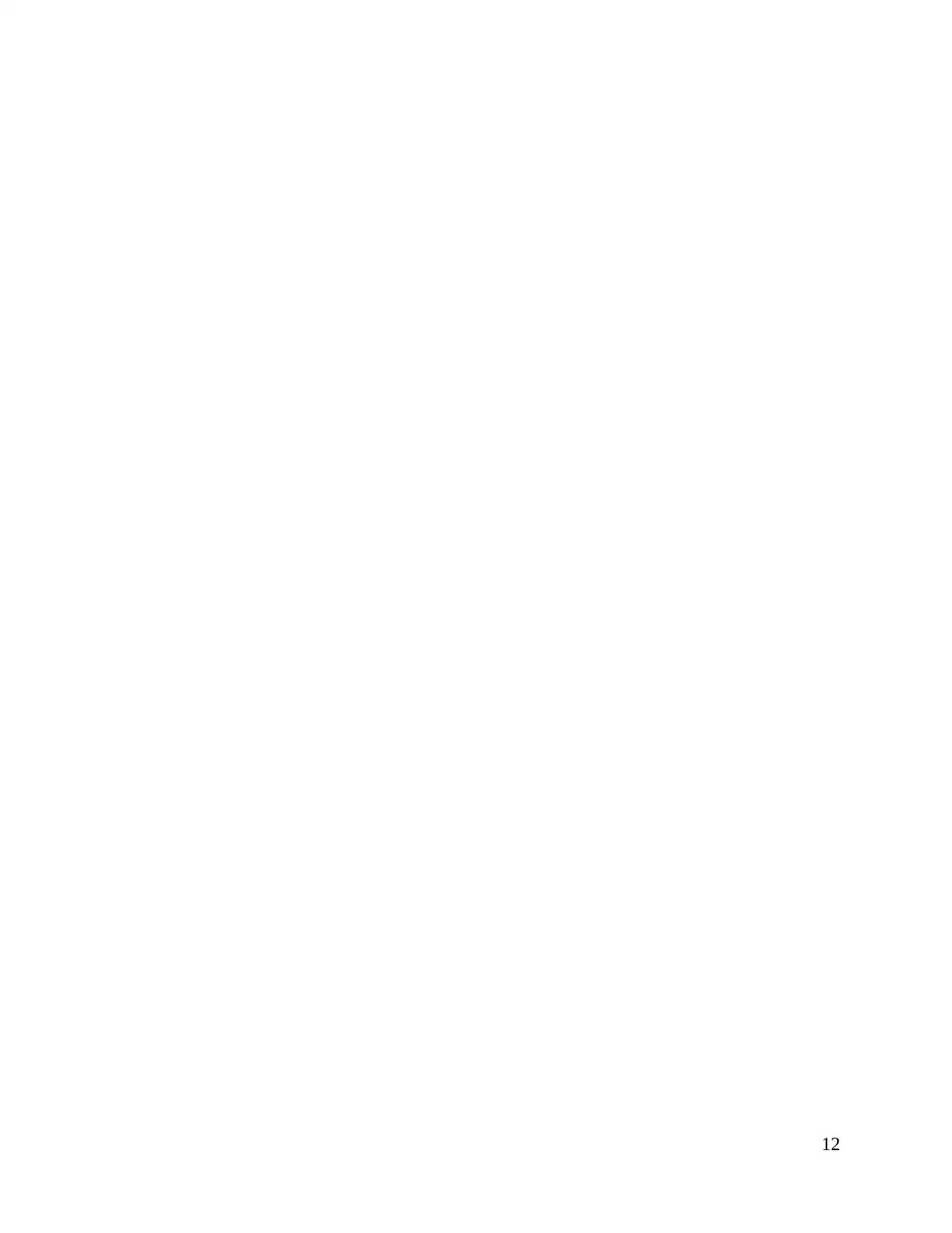
12
⊘ This is a preview!⊘
Do you want full access?
Subscribe today to unlock all pages.

Trusted by 1+ million students worldwide
1 out of 12
Related Documents
Your All-in-One AI-Powered Toolkit for Academic Success.
+13062052269
info@desklib.com
Available 24*7 on WhatsApp / Email
![[object Object]](/_next/static/media/star-bottom.7253800d.svg)
Unlock your academic potential
Copyright © 2020–2025 A2Z Services. All Rights Reserved. Developed and managed by ZUCOL.





